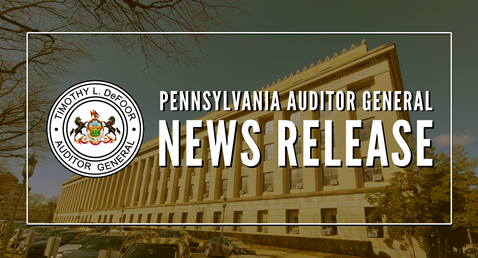Auditor General DePasquale Says Mercer County Career Center Must Correct Poor Budgeting, Business Practices
Lack of Oversight Resulted in Overpayment of $2.3 Million in Tuition by Participating Schools Districts
Auditor General DePasquale Says Mercer County Career Center Must Correct Poor Budgeting, Business Practices
Lack of Oversight Resulted in Overpayment of
$2.3 Million in Tuition by Participating Schools Districts
HARRISBURG (Sept. 6, 2013) – Auditor General Eugene DePasquale today said the Mercer County Career Center in Northwestern Pennsylvania must overhaul its business operations and budget practices to comply with the school code and prevent overcharging 10 participating school districts. Between 2010 and 2012, participating schools were overcharged more than $2.3 million in tuition, which was eventually reimbursed.
“The business practices at Mercer County Career Center require a complete overhaul and more consistent oversight,” DePasquale said. “Mercer County Career Center must make some serious improvements to become a more efficient and accountable educational institution. The taxpayers demand and students deserve an efficient and effective school operation.”
The issue of tuition overpayments was the result of the center including appropriations for 11 to 13 unfilled positions for programs that were not being offered. In addition, auditors noted that the center understated the revenue from non-participating school districts, as well as revenue from charter school students who were enrolled in the Center. By using the inflated budget figures, the center received more tuition from its participating school districts than was necessary for the 2011-12 and 2010-11 school years and created a false financial cushion.
In addition to the tuition overpayment issue, auditors found that during the period of November 2010 through October 2012 Mercer County Career Center:
- failed to provide proper public notice for the approval of the center’s preliminary and final budgets;
- failed to follow the provisions of a school building construction bond by failing to submit a final account report to the Department of Education, not following payment schedules and not requesting reimbursements from the bond agent in a timely manner;
- failed to provide evidence that the center’s joint operating committee approved tuition payments for students from a charter school;
- failed to prepare or present financial statements for review by the joint operating committee;
- failed to provide the joint operating committee with budget reports, which prevented the committee from providing oversight of the center’s spending and revenues and mandating any needed changes;
- failed to involve the business office in program operations, including a pre-school program and a beauty shop, which prevented a cost analysis to determine the proper fees to be charged to the public to prevent taxpayers from subsidizing these services;
- failed to keep an inventory system or other controls to account for tools and equipment in the center’s trade shops; and
- failed to have the joint operating committee approve financial institutions used by the center.
To resolve the issues identified in the audit, DePasquale recommended that the center:
- cease overstating expenditures and understating revenues in the annual budget. In addition, develop a realistic budget that charges the center’s participating school districts a tuition rate reflective of the budget;
- develop and implement procedures to ensure that both preliminary and final budgets are prepared, presented, and approved by the joint operating committee in compliance with state law;
- consult with the independent auditors to develop necessary procedures to ensure that monthly financial statements are prepared in accordance with Generally Accepted Accounting Principles and presented to the joint operating committee;
- require the business office to implement procedures to ensure timely reimbursement of excess funds received from participating districts;
- require administrative personnel to report to the joint operating committee all non-participating and charter school students for approval and tuition recognition;
- ensure that the center’s business manager is proficient in the use of its financial software program and amend his/her job description to tie this proficiency to job performance;
- require the business office to develop appropriate cost analysis procedures to ensure that general public program fees are sufficient to cover associated costs and that general funds are not subsidizing non-student related expenses, such as the beauty shop and childcare center;
- develop and implement an appropriate inventory control system to ensure that equipment, tools, and supplies are properly accounted for and that center funds are not being needlessly expended to replace unaccounted for tools and equipment;
- ensure that the joint operating committee is receiving budgetary reports that include individual line-item budgets, monthly and year-to-date activity, appropriation encumbrances, and remaining budgetary amounts; and
- ensure that, prior to approving the center’s budget, the joint operating committee closely review the revenues and expenditures to ensure they are accurately forecasted.
The Mercer County Career Center provided educational services to 453 secondary pupils and 62 post-secondary pupils; employed 13 teachers, eight post-secondary teachers, 22 full- and part-time support personnel, and three administrators during the 2011-12 school year. The operation, administration and management of the Center are directed by a joint operating committee that comprises 10 members from the school districts of Commodore Perry, Greenville Area, Grove City Area, Hermitage, Jamestown Area, Lakeview, Mercer Area, Reynolds, Sharpsville Area and West Middlesex Area. The center’s joint operating committee members are appointed by the individual school boards. The department’s Bureau of School Audits examines the records of school districts, charter schools, intermediate units, and area vocational-technical schools. The audits — among other things — assess whether or not school entities received the state subsidies and reimbursements to which they were entitled, accurately managed taxpayer funds, and complied with ethics codes. The audits also determine whether or not teachers and administrators were properly certified for the positions they held during the audit period.
A full copy of the Mercer County Career Center Audit is online at:www.PaAuditor.gov/audit-reports.
# # #
